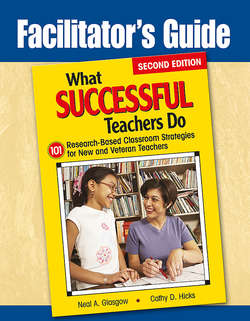Читать книгу Facilitator's Guide to What Successful Teachers Do - Группа авторов - Страница 8
На сайте Литреса книга снята с продажи.
ОглавлениеChapter-by-Chapter Study Guide
What Successful Teachers Do: 101 Research-Based Classroom Strategies for New and Veteran Teachers, Second Edition
by Neal A. Glasgow and Cathy D. Hicks
Preface
Discussion Questions
1. As a new or veteran teacher, what goals have you set for yourself this year?
2. What characteristics does a successful teacher possess? Who is a successful teacher in your school? What makes this teacher successful?
3. What’s in it for a school or district not to have to recruit and retain new teachers each year? Or, what’s in it for a school or district to retain excellent teachers?
4. How can site administrators and other school leaders assist in helping new and veteran teachers be successful?
5. What makes you want to be a successful teacher?
6. Explain what the concept “work smarter, not harder” means to you.
7. How can the experiences of veteran teachers aid a new teacher?
8. What do you expect from this book (or workshop seminar)?
Chapter 1. Interacting and Collaborating With Students
Empathy is one of the most valuable concepts or tools a teacher can possess when interacting with students. Seeing the classroom environment through the eyes of the students can serve all teachers well. This chapter features strategies that help teachers gain insight into how students see the educational environment and how this knowledge can be used to improve teaching and learning, specifically classroom interactions between teachers and students and between the students themselves. Highlights include the following:
• A look at homework, an uneven educational playing field that favors some and handicaps others.
• Strategies targeting a range of peer-to-peer interactions used to enhance cooperative learning opportunities.
• Insight into differentiation of instruction based on what research tells us about gender and learning.
• Techniques that increase self-reflection skills and reduce the emotional distance between teachers and their students.
Discussion Questions
1. Why do you give homework in your class?
2. What would be the ramifications of doing away with homework in your school?
3. What are some of the factors within your students’ lives that make homework success more doable for some and less doable for others?
4. How do you help students learn to reflect on their own academic success and failures?
5. How can you structure classroom activities so that your students learn the importance of team work?
6. What are a few caveats in allowing students to work cooperatively?
7. What are some positive results of having students become self-reflective learners?
8. What advantage is it to you to train students to become peer tutors?
9. How do you address gender issues in the classroom?
10. How is humor used successfully in your classroom?
